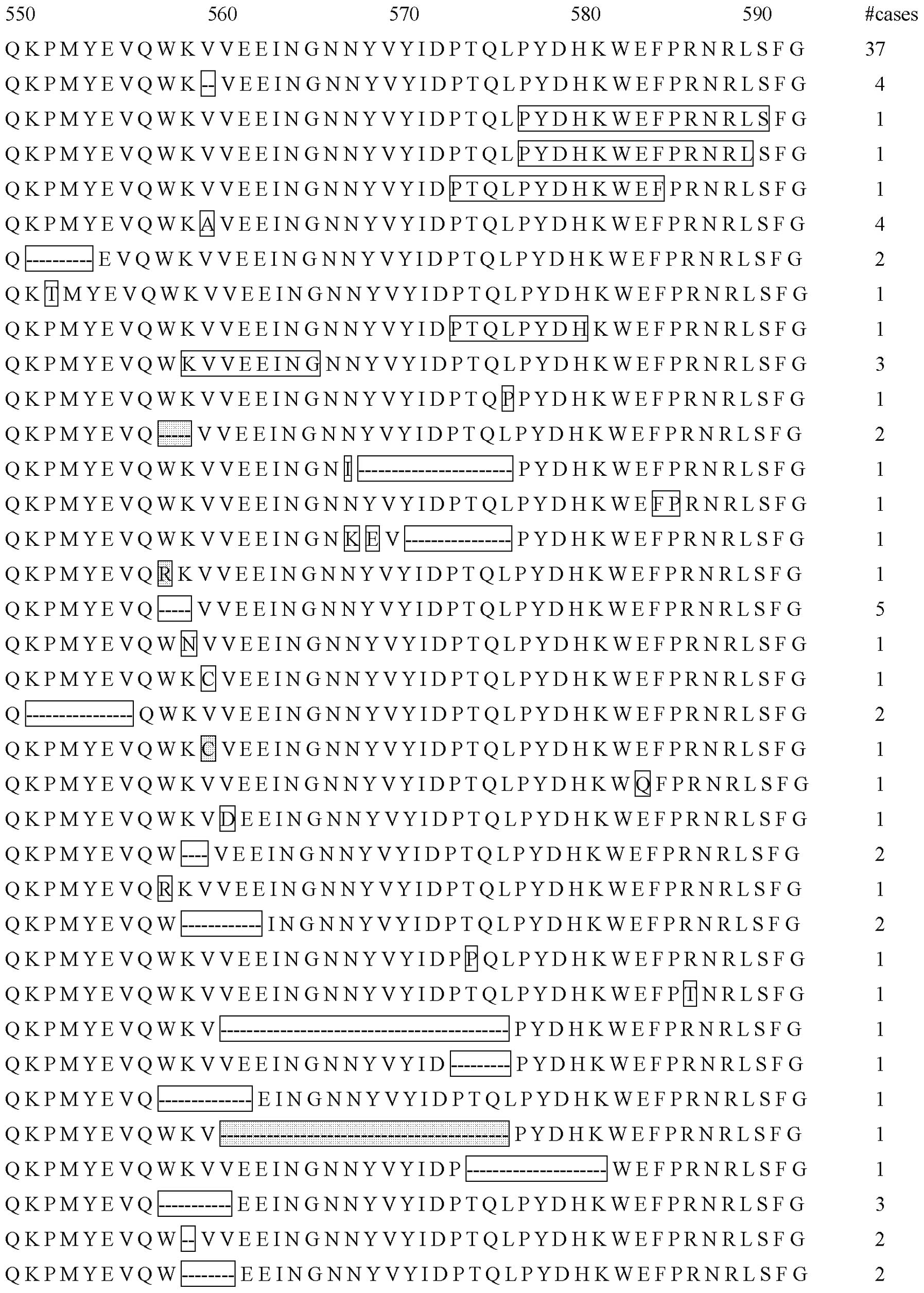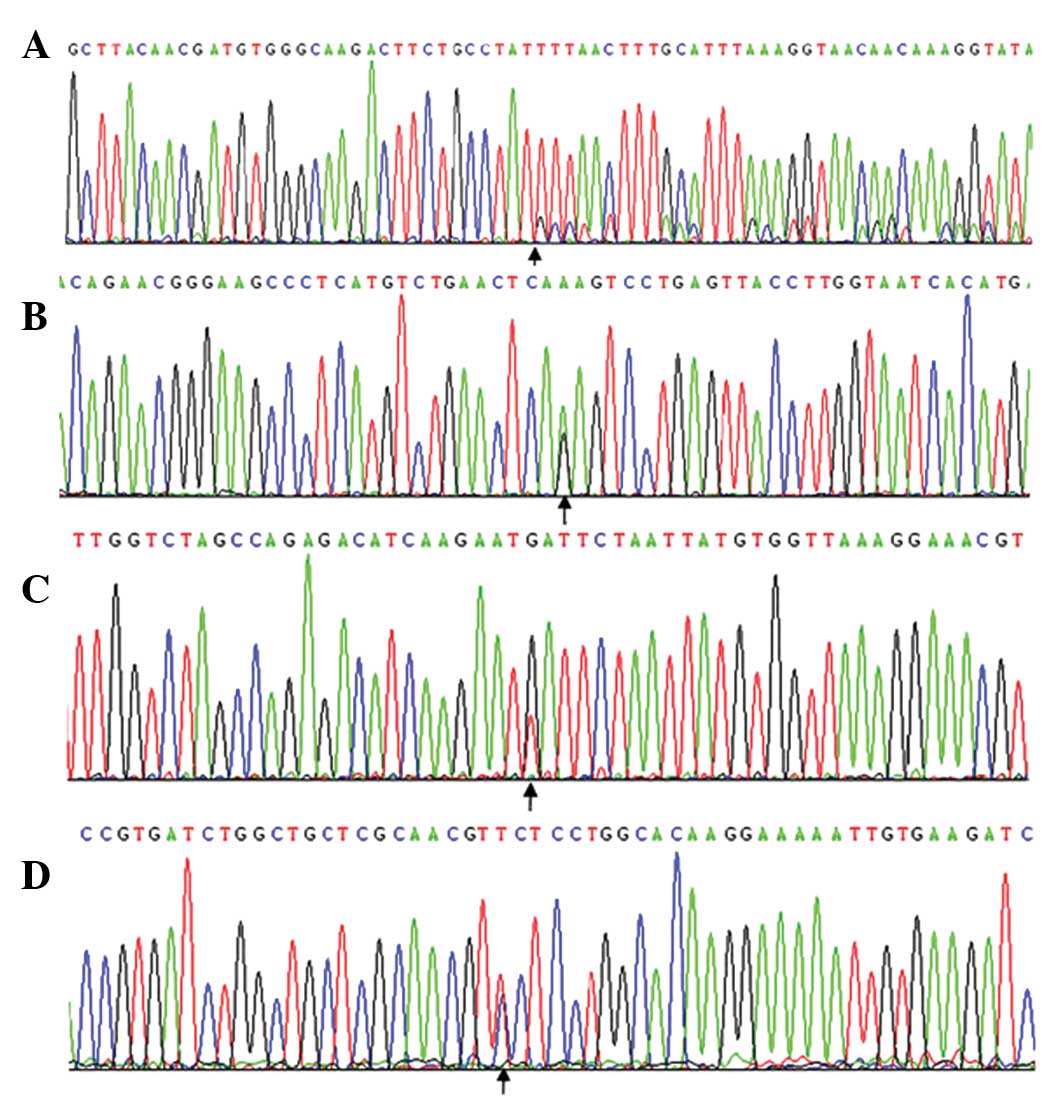|
1
|
Heinrich MC, Corless CL, Duensing A,
McGreevey L, Chen CJ, Joseph N, Singer S, Griffith DJ, Haley A,
Town A, et al: PDGFRA activating mutations in gastrointestinal
stromal tumors. Science. 299:708–710. 2003. View Article : Google Scholar : PubMed/NCBI
|
|
2
|
Nedeljkovic SS, Wasan A and Jamison RN:
Assessment of efficacy of long-term opioid therapy in pain patients
with substance abuse potential. Clin J Pain. 18 (4 Suppl):S39–S51.
2002. View Article : Google Scholar : PubMed/NCBI
|
|
3
|
Joensuu H and Kindblom LG:
Gastrointestinal stromal tumors - a review. Acta Orthop Scand
Suppl. 75:62–71. 2004. View Article : Google Scholar : PubMed/NCBI
|
|
4
|
Lasota J, Jasinski M, Sarlomo-Rikala M and
Miettinen M: Mutations in exon 11 of c-kit occur preferentially in
malignant versus benign gastrointestinal stromal tumors and do not
occur in leiomyomas or leiomyosarcomas. Am J Pathol. 154:53–60.
1999. View Article : Google Scholar : PubMed/NCBI
|
|
5
|
Kim TW, Lee H, Kang YK, Choe MS, Ryu MH,
Chang HM, Kim JS, Yook JH, Kim BS and Lee JS: Prognostic
significance of c-kit mutation in localized gastrointestinal
stromal tumors. Clin Cancer Res. 10:3076–3081. 2004. View Article : Google Scholar : PubMed/NCBI
|
|
6
|
Corless CL, McGreevey L, Haley A, Town A
and Heinrich MC: KIT mutations are common in incidental
gastrointestinal stromal tumors one centimeter or less in size. Am
J Pathol. 160:1567–1572. 2002. View Article : Google Scholar : PubMed/NCBI
|
|
7
|
He HY, Fang WG, Zhong HH, Li Y, Zheng J,
Du J, Heng WJ and Wu BQ: Status and clinical implication of c-kit
and PDGFRA mutations in 165 cases of gastrointestinal stromal tumor
(GIST). Zhonghua Bing Li Xue Za Zhi. 35:262–266. 2006.(In Chinese).
PubMed/NCBI
|
|
8
|
Debiec-Rychter M, Dumez H, Judson I, Wasag
B, Verweij J, Brown M, Dimitrijevic S, Sciot R, Stul M, Vranck H,
Scurr M, Hagemeijer A, van Glabbeke M and van Oosterom ATEORTC Soft
Tissue and Bone Sarcoma Group: Use of c-KIT/PDGFRA mutational
analysis to predict the clinical response to imatinib in patients
with advanced gastrointestinal stromal tumours entered on phase I
and II studies of the EORTC soft tissue and bone sarcoma group. Eur
J Cancer. 40:689–695. 2004. View Article : Google Scholar : PubMed/NCBI
|
|
9
|
Miettinen M and Lasota J: Gastrointestinal
stromal tumors: Review on morphology, molecular pathology,
prognosis and differential diagnosis. Arch Pathol Lab Med.
130:1466–1478. 2006.PubMed/NCBI
|
|
10
|
Piao J and Liu S, Xu Y, Wang C, Lin Z, Qin
Y and Liu S: Ezrin protein overexpression predicts the poor
prognosis of pancreatic ductal adenocarcinomas. Exp Mol Pathol.
98:1–6. 2015. View Article : Google Scholar : PubMed/NCBI
|
|
11
|
Fletcher CD, Berman JJ, Corless C,
Gorstein F, Lasota J, Longley BJ, Miettinen M, O'Leary TJ, Remotti
H, Rubin BP, et al: Diagnosis of gastrointestinal stromal tumors: A
consensus approach. Hum Pathol. 33:459–465. 2002. View Article : Google Scholar : PubMed/NCBI
|
|
12
|
Hirota S, Isozaki K, Moriyama Y, Hashimoto
K, Nishida T, Ishiguro S, Kawano K, Hanada M, Kurata A, Takeda M,
et al: Gain-of-function mutations of c-kit in human
gastrointestinal stromal tumors. Science. 279:577–580. 1998.
View Article : Google Scholar : PubMed/NCBI
|
|
13
|
Hou YY and Zhu XZ: Gastrointestinal
stromal tumor molecular biology. Cancer Res Clin. 18:507–512.
2006.
|
|
14
|
Battochio A, Mohammed S, Winthrop D,
Lefresne S, Mulder K, Chu Q, O'Hara C and Lai R: Detection of c-KIT
and PDGFRA gene mutations in gastrointestinal stromal tumors:
Comparison of DHPLC and DNA sequencing methods using a single
population-based cohort. Am J Clin Pathol. 133:149–155. 2010.
View Article : Google Scholar : PubMed/NCBI
|
|
15
|
Wozniak A, Rutkowski P, Piskorz A,
Ciwoniuk M, Osuch C, Bylina E, Sygut J, Chosia M, Rys J, Urbanczyk
K, et al Polish Clinical GIST Registry: Prognostic value of
KIT/PDGFRA mutations in gastrointestinal stromal tumours (GIST):
Polish Clinical GIST Registry Experience. Ann Oncol. 23:353–360.
2012. View Article : Google Scholar : PubMed/NCBI
|
|
16
|
Corless CL, Fletcher JA and Heinrich MC:
Biology of gastrointestinal stromal tumors. J Clin Oncol.
22:3813–3825. 2004. View Article : Google Scholar : PubMed/NCBI
|
|
17
|
Lasota J, Wozniak A, Sarlomo-Rikala M, Rys
J, Kordek R, Nassar A, Sobin LH and Miettinen M: Mutations in exons
9 and 13 of KIT gene are rare events in gastrointestinal stromal
tumors. A study of 200 cases. Am J Pathol. 157:1091–1095. 2000.
View Article : Google Scholar : PubMed/NCBI
|
|
18
|
Antonescu CR, Sommer G, Sarran L,
Tschernyavsky SJ, Riedel E, Woodruff JM, Robson M, Maki R, Brennan
MF, Ladanyi M, et al: Association of KIT exon 9 mutations with
nongastric primary site and aggressive behavior: KIT mutation
analysis and clinical correlates of 120 gastrointestinal stromal
tumors. Clin Cancer Res. 9:3329–3337. 2003.PubMed/NCBI
|
|
19
|
Lasota J, Dansonka-Mieszkowska A, Stachura
T, Schneider-Stock R, Kallajoki M, Steigen SE, Sarlomo-Rikala M,
Boltze C, Kordek R, Roessner A, et al: Gastrointestinal stromal
tumors with internal tandem duplications in 3′ end of KIT
juxtamembrane domain occur predominantly in stomach and generally
seem to have a favorable course. Mod Pathol. 16:1257–1264. 2003.
View Article : Google Scholar : PubMed/NCBI
|
|
20
|
Medeiros F, Corless CL, Duensing A,
Hornick JL, Oliveira AM, Heinrich MC, Fletcher JA and Fletcher CD:
KIT-negative gastrointestinal stromal tumors: Proof of concept and
therapeutic implications. Am J Surg Pathol. 28:889–894. 2004.
View Article : Google Scholar : PubMed/NCBI
|
|
21
|
Tzen CY and Mau BL: Analysis of
CD117-negative gastrointestinal stromal tumors. World J
Gastroenterol. 11:1052–1055. 2005. View Article : Google Scholar : PubMed/NCBI
|
|
22
|
Tu H, Li Q, Cai J, Chen Z, Yang H, Jiang
H, Mao Y, Shou Z and Chen J: Extragastrointestinal stromal tumor in
a kidney transplant recipient. Clin Exp Nephrol. 16:350–353. 2012.
View Article : Google Scholar : PubMed/NCBI
|
|
23
|
Li J: Molecular target therapy for
gastrointestinal stromal tumor. Zhong Hua Xiao Hua Wai Ke Za Zhi.
12:253–256. 2013.(In Chinese).
|
|
24
|
Nickl NJ: Gastrointestinal stromal tumors:
New progress, new questions. Curr Opin Gastroenterol. 20:482–487.
2004. View Article : Google Scholar : PubMed/NCBI
|
|
25
|
Chen H: Mutation of c-kit and PDGFRA Genes
in Gastrointestinal Stromal Tumor. Zhong Guo Sheng Wu Hua Xue Yu
Fen Zi Sheng Wu Xue Bao. 12:697–701. 2009.(In Chinese).
|
|
26
|
He H, Xiang Y, Li Y, Zhong G, Wu B and
Zheng J: c-kit and PDGFRA mutat ions in 60 cases of
gastrointestinal stromal tumors (GISTs). Beijing Da Xue Xue Bao.
37:320–324. 2005.(In Chinese). PubMed/NCBI
|
|
27
|
Kim SY, Janeway K and Pappo A: Pediatric
and wild-type gastrointestinal stromal tumor: New therapeutic
approaches. Curr Opin Oncol. 22:347–350. 2010. View Article : Google Scholar : PubMed/NCBI
|
















